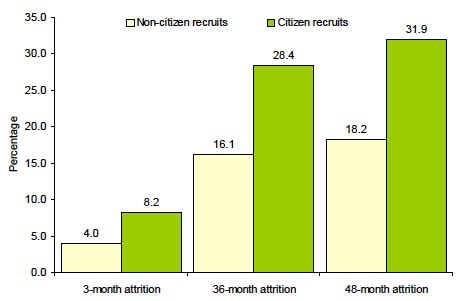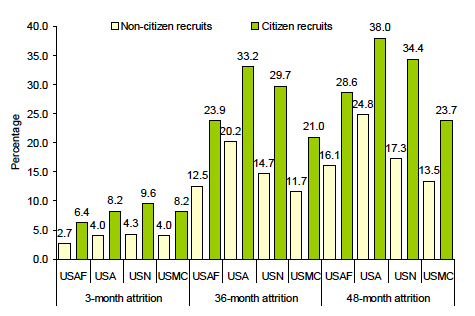
CNA
Well, there’s a kick in the teeth to all you red-blooded Americans wearing your country’s uniform: It turns out non-Americans donning U.S. military garb have more stick-to-itiveness than you, as well as having vital skills the U.S. military needs that you don’t have, to boot.
Non-citizens are “a potential source of language and cultural skills that are of strategic importance to military operations outside of the U.S.,” the new Pentagon report notes. Adds an earlier study from the Center for Naval Analyses: “…relative to citizen recruits, non-citizen recruits generally have a stronger attachment to serving the United States, which they now consider to be `their country,’ and have a better work ethic.”
In the wake of 9/11, President Bush signed an executive order that allows legal aliens to enlist and become eligible for citizenship after one day of honorable service in the military (it used to be three years). That means that most of them become citizens before they even leave basic training.
Between 1999 and 2010, 80,000 non-citizens enlisted in the U.S. military, representing 4% — one out of 25 — recruits. The Navy had 5.2% non-citizen recruits, the Army and Marines were at about 4% each, and non-citizen recruits made up 2.3% of Air Force recruits. “As a large portion of the growth in the U.S. population is from immigration, non-citizens represent a growing source of potential military recruits,” the new report on Pentagon demographics says.

CNA
Non-citizens have to be legal permanent residents of the U.S., have a high school diploma, and speak English well enough to meet each service’s requirements, in order to enlist. All regular U.S. military officers must be U.S. citizens. There were 16,500 non-citizens serving in uniform in mid-2010, constituting 1.4% of the enlisted force.
The Pentagon demographic report says that non-citizen recruits are more likely to be female, minority, older, married or with dependents than citizen recruits, but less likely to be those the military describes as “high quality” or have an enlistment waiver – for minor crimes or other reasons — when they sign up.
Adds the CNA study:
…our data show that non-citizen recruits are likely to possess language and cultural skills that are of strategic interest to the U.S. military. As the U.S. economy improves and the military enters a more difficult recruiting environment, it is important to keep in mind this population’s potential as a recruiting resource. This is especially important given the recent declines in fertility rates associated with the current economic crisis. In the coming decades, the only source of net growth in the U.S. recruiting-age population is projected to be immigration (that is, immigrants and their U.S.-born children).
The report, along with the CNA study, suggest the military is getting a bargain when non-citizens enlist: they are much more likely to complete their initial hitch, usually three or four years, than native-born Americans. Only 4% of non-citizens drop out of the military within three months, half the rate of citizens, the CNA report found. By the four-year mark, one in three citizen recruits has bailed, compared to one in five non-citizens. Every soldier, sailor, airman or Marine who leaves early has to be replaced, with all the additional training and outfitting that requires.
Non-citizens are barred from holding security clearances, which means they qualify for only one quarter of the Air Force’s enlisted billets. They’re eligible for about 40% of Navy slots, and half of the Army and Marine assignments. The Air Force also bars non-citizens from re-enlisting. The other three services have no such restriction, although until 2007 the Army barred non-citizens from more than eight years of service.
The U.S. Citizenship and Immigration Services have the power to revoke the citizenship of any service member who leaves the military with an other-than-honorable discharge after less than five years in uniform. “To our knowledge, however,” CNA added, “USCIS does not have sufficient visibility on attrition from the services to be able to enforce this, nor does this currently seem to be a priority for USCIS.”
*At least when it comes to first-term attrition, their work ethic, and certain language skills


